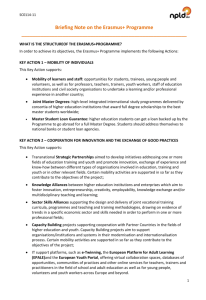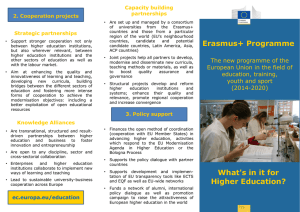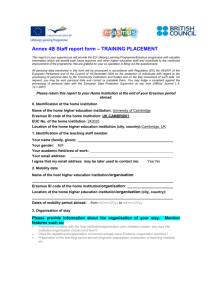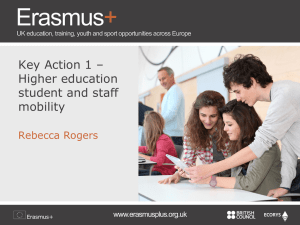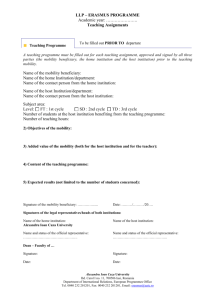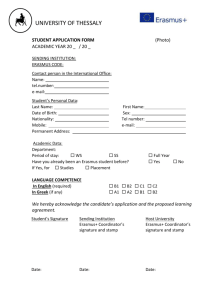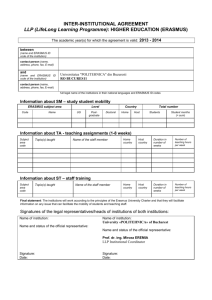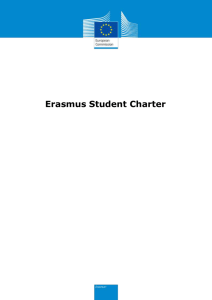Version 2 July, 2014 Grant agreement Erasmus+ HE studies or
advertisement
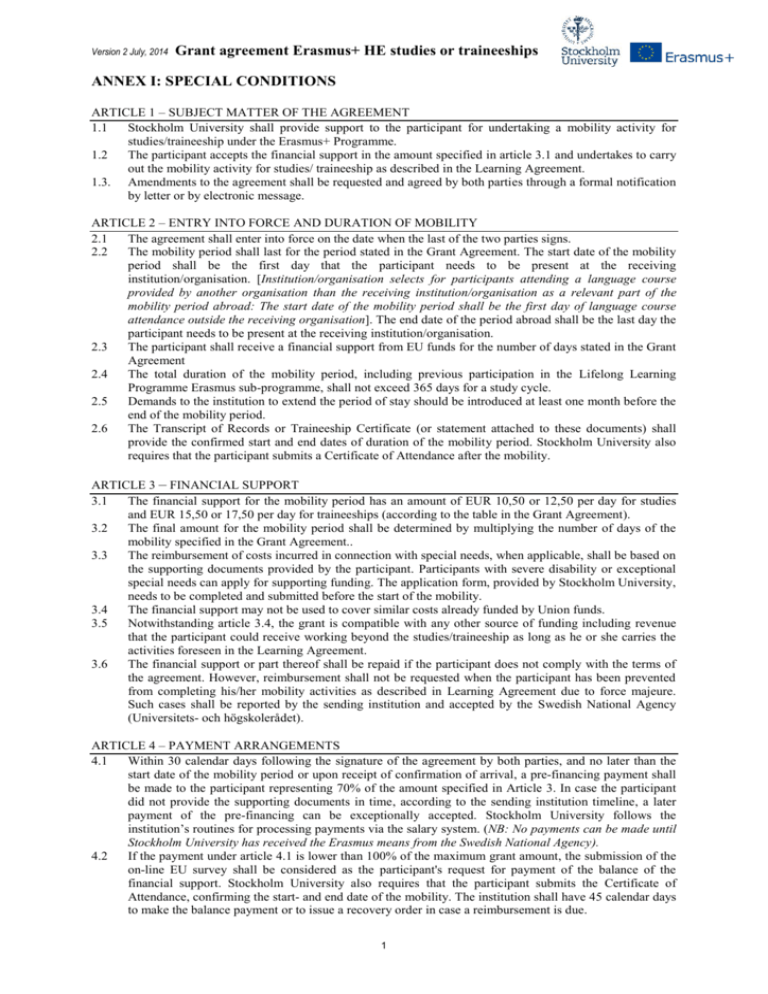
Version 2 July, 2014 Grant agreement Erasmus+ HE studies or traineeships ANNEX I: SPECIAL CONDITIONS ARTICLE 1 – SUBJECT MATTER OF THE AGREEMENT 1.1 Stockholm University shall provide support to the participant for undertaking a mobility activity for studies/traineeship under the Erasmus+ Programme. 1.2 The participant accepts the financial support in the amount specified in article 3.1 and undertakes to carry out the mobility activity for studies/ traineeship as described in the Learning Agreement. 1.3. Amendments to the agreement shall be requested and agreed by both parties through a formal notification by letter or by electronic message. ARTICLE 2 – ENTRY INTO FORCE AND DURATION OF MOBILITY 2.1 The agreement shall enter into force on the date when the last of the two parties signs. 2.2 The mobility period shall last for the period stated in the Grant Agreement. The start date of the mobility period shall be the first day that the participant needs to be present at the receiving institution/organisation. [Institution/organisation selects for participants attending a language course provided by another organisation than the receiving institution/organisation as a relevant part of the mobility period abroad: The start date of the mobility period shall be the first day of language course attendance outside the receiving organisation]. The end date of the period abroad shall be the last day the participant needs to be present at the receiving institution/organisation. 2.3 The participant shall receive a financial support from EU funds for the number of days stated in the Grant Agreement 2.4 The total duration of the mobility period, including previous participation in the Lifelong Learning Programme Erasmus sub-programme, shall not exceed 365 days for a study cycle. 2.5 Demands to the institution to extend the period of stay should be introduced at least one month before the end of the mobility period. 2.6 The Transcript of Records or Traineeship Certificate (or statement attached to these documents) shall provide the confirmed start and end dates of duration of the mobility period. Stockholm University also requires that the participant submits a Certificate of Attendance after the mobility. ARTICLE 3 – FINANCIAL SUPPORT 3.1 The financial support for the mobility period has an amount of EUR 10,50 or 12,50 per day for studies and EUR 15,50 or 17,50 per day for traineeships (according to the table in the Grant Agreement). 3.2 The final amount for the mobility period shall be determined by multiplying the number of days of the mobility specified in the Grant Agreement.. 3.3 The reimbursement of costs incurred in connection with special needs, when applicable, shall be based on the supporting documents provided by the participant. Participants with severe disability or exceptional special needs can apply for supporting funding. The application form, provided by Stockholm University, needs to be completed and submitted before the start of the mobility. 3.4 The financial support may not be used to cover similar costs already funded by Union funds. 3.5 Notwithstanding article 3.4, the grant is compatible with any other source of funding including revenue that the participant could receive working beyond the studies/traineeship as long as he or she carries the activities foreseen in the Learning Agreement. 3.6 The financial support or part thereof shall be repaid if the participant does not comply with the terms of the agreement. However, reimbursement shall not be requested when the participant has been prevented from completing his/her mobility activities as described in Learning Agreement due to force majeure. Such cases shall be reported by the sending institution and accepted by the Swedish National Agency (Universitets- och högskolerådet). ARTICLE 4 – PAYMENT ARRANGEMENTS 4.1 Within 30 calendar days following the signature of the agreement by both parties, and no later than the start date of the mobility period or upon receipt of confirmation of arrival, a pre-financing payment shall be made to the participant representing 70% of the amount specified in Article 3. In case the participant did not provide the supporting documents in time, according to the sending institution timeline, a later payment of the pre-financing can be exceptionally accepted. Stockholm University follows the institution’s routines for processing payments via the salary system. (NB: No payments can be made until Stockholm University has received the Erasmus means from the Swedish National Agency). 4.2 If the payment under article 4.1 is lower than 100% of the maximum grant amount, the submission of the on-line EU survey shall be considered as the participant's request for payment of the balance of the financial support. Stockholm University also requires that the participant submits the Certificate of Attendance, confirming the start- and end date of the mobility. The institution shall have 45 calendar days to make the balance payment or to issue a recovery order in case a reimbursement is due. 1 ARTICLE 5 – INSURANCE 5.1 The participant shall have adequate insurance coverage. During Erasmus+ studies the participant will automatically be covered by the insurance “Student UT” (by Kammarkollegiet, insurance number 202100-3062). The sending department at Stockholm University is responsible for issuing and providing the student with a Medical Insurance Card and an Insurance Certificate in English. Insurance terms and conditions as well as insurance claim form are found at www.kammarkollegiet.se. It is the students’ responsibility to read through the insurance terms and conditions and, if found necessary, buy a complementary insurance. The “Student UT”-insurance includes health insurance. However, the student should also make sure to order and bring the European Health Insurance Card (see www.forsakringskassan.se/privatpers/utomlands/eukort). During Erasmus+ traineeship the participants’ insurance will be organized as stated in the Learning Agreement for Traineeship. 5.2 Concerning the organisation of health insurance coverage: The participant is responsible for having a valid European Health Insurance Card throughout the mobility period (www.forsakringskassan.se/privatpers/utomlands/eukort). The coverage of the European Health Insurance Card or private insurance may not be sufficient, especially in case of repatriation and specific medical intervention. It is the responsibility of the student to read through the insurance terms and conditions and, if found necessary, buy a complementary insurance. 5.3 Concerning the organisation of liability insurance coverage (covering damages caused by the student at the workplace/study place): During Erasmus+ studies the participant will automatically be covered by the insurance “Student UT”, which includes liability coverage. It is, however, the students’ responsibility to read through the insurance terms and, if found necessary, buy a complementary insurance. During Erasmus+ traineeships the participants insurance, including liability coverage, will be organised as stated in the Learning Agreement for Traineeship. It is the participants responsibility to read through the insurance terms and conditions and, if found necessary, buy an complementary insurance. 5.4 Concerning accident insurance coverage (covering at least damages caused to the student at the workplace/study place): During Erasmus+ studies the participant will automatically be covered by the insurance “Student UT”, which includes accident coverage. It is however, the students’ responsibility to read through the insurance terms and conditions and, if found necessary, buy a complementary insurance. During Erasmus+ traineeships the participants insurance, including accident coverage, will be organised as stated in the Learning Agreement for Traineeship. It is the participants’ responsibility to read through the insurance terms and, if found necessary, buy a complementary insurance. ARTICLE 6 – ONLINE LINGUISTIC SUPPORT [Only applicable for mobilities starting after 1 October 2014 for the languages available in the on-line tool] 6.1. The participant shall carry out an online assessment of linguistic competences before and at the end of the mobility period if the main language of instruction or work is English, French, German, Italian, or Spanish, or whenever agreed with the sending institution, with the exception of native speakers. The participant shall immediately inform the institution if he/she is unable to carry out the online assessment. 6.2 The participant shall follow the online language course in order to prepare for the mobility period abroad, using the licence. The participant shall immediately inform the institution if he/she is unable to carry out the online course. 6.3 The payment of the final instalment of the financial support is subject to the submission of the compulsory online assessment at the end of the mobility. ARTICLE 7 – EU SURVEY 7.1. The participant shall complete and submit the on-line EU Survey after the mobility abroad within 30 calendar days upon receipt of the invitation to complete it. Participants who fail to complete and submit the on-line EU Survey may be required by their institution to partially or fully reimburse the financial support received. 7.2 A complementary on-line survey may be sent to the participant allowing for full reporting on recognition issues. ARTICLE 8 – LAW APPLICABLE AND COMPETENT COURT 8.1 The Agreement is governed by the laws of Sweden. 8.2 The competent court determined in accordance with the applicable national law shall have sole jurisdiction to hear any dispute between the institution and the participant concerning the interpretation, application or validity of this Agreement, if such dispute cannot be settled amicably. 2 ANNEX II : GENERAL CONDITIONS Article 1: Liability Each party of this agreement shall exonerate the other from any civil liability for damages suffered by him or his staff as a result of performance of this agreement, provided such damages are not the result of serious and deliberate misconduct on the part of the other party or his staff. The National Agency of Sweden the European Commission or their staff shall not be held liable in the event of a claim under the agreement relating to any damage caused during the execution of the mobility period. Consequently, the National Agency of Sweden or the European Commission shall not entertain any request for indemnity of reimbursement accompanying such claim. Article 2: Termination of the agreement In the event of failure by the participant to perform any of the obligations arising from the agreement, and regardless of the consequences provided for under the applicable law, the institution is legally entitled to terminate or cancel the agreement without any further legal formality where no action is taken by the participant within one month of receiving notification by registered letter. If the participant terminates the agreement before its agreement ends or if he/she fails to follow the agreement in accordance with the rules, he/she shall have to refund the amount of the grant already paid. In case of termination by the participant due to "force majeure", i.e. an unforeseeable exceptional situation or event beyond the participant's control and not attributable to error or negligence on his/her part, the participant shall be entitled to receive the amount of the grant corresponding to the actual duration of the mobility period as defined in article 2.2. Any remaining funds shall have to be refunded, except if agreed differently with the sending organisation. Article 3: Data Protection All personal data contained in the agreement shall be processed in accordance with Regulation (EC) No 45/2001 of the European Parliament and of the Council on the protection of individuals with regard to the processing of personal data by the EU institutions and bodies and on the free movement of such data. Such data shall be processed solely in connection with the implementation and follow-up of the agreement by the sending institution, the National Agency and the European Commission, without prejudice to the possibility of passing the data to the bodies responsible for inspection and audit in accordance with EU legislation (Court of Auditors or European Antifraud Office (OLAF)). The participant may, on written request, gain access to his personal data and correct any information that is inaccurate or incomplete. He/she should address any questions regarding the processing of his/her personal data to the sending institution and/or the National Agency. The participant may lodge a complaint against the processing of his personal data with the [national supervising body for data protection] with regard to the use of these data by the sending institution, the National Agency, or to the European Data Protection Supervisor with regard to the use of the data by the European Commission. Article 4: Checks and Audits The parties of the agreement undertake to provide any detailed information requested by the European Commission, the National Agency of Sweden or by any other outside body authorised by the European Commission or the National Agency of Sweden to check that the mobility period and the provisions of the agreement are being properly implemented. 3 GfNA-II-Annex IV-III-Erasmus+ Erasmus Student Charter – version June 2014 Higher Education Erasmus Student Charter ANNEX III: Erasmus Student Charter This Student Charter highlights your rights and obligations and informs you about what you can expect from your sending and receiving organisation at each step of your mobility. Higher education institutions participating in Erasmus+ have been awarded an Erasmus Charter for Higher Education by the European Commission where they commit to support, facilitate and recognise your mobility activities. On your side, you commit to respect the rules and obligations of the Erasmus+ grant agreement that you have signed with your sending institution. I. Before your mobility period Once you have been selected as Erasmus+ student, you are entitled to guidance regarding the partner institutions or enterprises where you can carry out your mobility period and the activities that you can undertake there. You have the right to receive information on the distribution of grades at the receiving institution and to receive information in securing a visa, obtaining insurance and finding housing by your sending and receiving institution/enterprise. You can find the respective contacts points and information sources in the inter-institutional agreement signed between your sending and receiving institutions. You will sign a Grant Agreement with your sending institution (even if you do not receive a financial support from EU funds), and a Learning Agreement with your sending and receiving institution/enterprise. A good preparation of your Learning Agreement is key for the success of your mobility experience and to ensure recognition of your mobility period. It sets out the details of your planned activities abroad (including the credits to be earned and that will count towards your home degree). After you have been selected, you will undertake an on-line language assessment (if available in your main language of instruction/work abroad) that will allow your sending institution to offer you the most appropriate linguistic support, if necessary. You should take full advantage of this support to improve your language skills to the recommended level. II. During your mobility period You should take full advantage of all the learning opportunities available at the receiving institution/enterprise, while respecting its rules and regulations, and endeavour to perform to the best of your ability in all relevant examinations or other forms of assessment. You can request changes to the Learning Agreement only in exceptional situations and within the deadline decided by your sending and receiving institutions. In that case, you must ensure that these changes are validated by both the sending and receiving institutions/enterprise within a two-week period after the request and keep copies of their approval by e-mail. Changes due to an extension of the duration of the mobility period should be made as timely as possible as well. GfNA-II-Annex IV-III-Erasmus+ Erasmus Student Charter – version June 2014 Higher Education Erasmus Student Charter Your receiving institution/enterprise commits to treat you in the same way as their home students/employees and you should make all necessary efforts to integrate in your new environment. Your receiving institution examinations, access to period. Nevertheless, you students for costs such as material. You are invited to take part in associations existing at your receiving institution/enterprise, such as networks of mentors and buddies organised by student organisations such as "Erasmus Student Network". Your student grant or student loan from your home country must be maintained while you are abroad. will not ask you to pay fees for tuition, registration, laboratory and library facilities during your mobility may be charged small fees on the same basis as local insurance, student unions and the use of miscellaneous III. After your mobility period You are entitled to receive full academic recognition from your sending institution for satisfactorily completed activities during your mobility period, in accordance with the Learning Agreement. If you are studying abroad, your receiving institution will give you a Transcript of Records recording your results with the credits and grades achieved (normally in less than five weeks after the end of your evaluation). Upon reception of this document, your sending institution will provide you all the information on their recognition in a maximum period of five weeks. The recognised components (for example, courses) will appear in your Diploma Supplement. If you are doing a traineeship, your enterprise will give you a Traineeship Certificate summarising the tasks carried out and an evaluation and, when it was foreseen in your learning agreement, your sending institution will also give you a Transcript of Records. If the traineeship was not part of the curriculum, the period will at least be recorded in your Diploma Supplement and, if you wish, in your Europass Mobility Document. If you are a recent graduate you are encouraged to request the Europass Mobility Document. You should undergo an on-line language assessment, if available in your main language of instruction/work abroad, to monitor linguistic progress during your mobility. You must fill in a questionnaire to provide feedback on your Erasmus mobility period to your sending and receiving institution, the National Agency of the sending and receiving country and the European Commission. You are invited to join the "Erasmus+ student and alumni association" and you are encouraged to share your mobility experience with your friends, other students, staff in your institution, journalists and let other people benefit from your experience, including young pupils. - If you have a problem, at any time: You should identify the problem clearly and check your rights and obligations according to your grant agreement. Several people work in your sending and receiving institutions to help Erasmus students. Depending on the nature of the problem and when it occurs, the contact person or the responsible person at your sending or receiving institution (or receiving enterprise in case GfNA-II-Annex IV-III-Erasmus+ Erasmus Student Charter – version June 2014 Higher Education Erasmus Student Charter - of a traineeship) will be able to help you. Their names and contact details are specified in your Learning Agreement. Use the formal appeal procedures in your sending institution if necessary. If your sending or receiving institution fails to fulfil the obligations outlined in the Erasmus Charter for Higher Education or in your grant agreement, you can contact the related National Agency.
